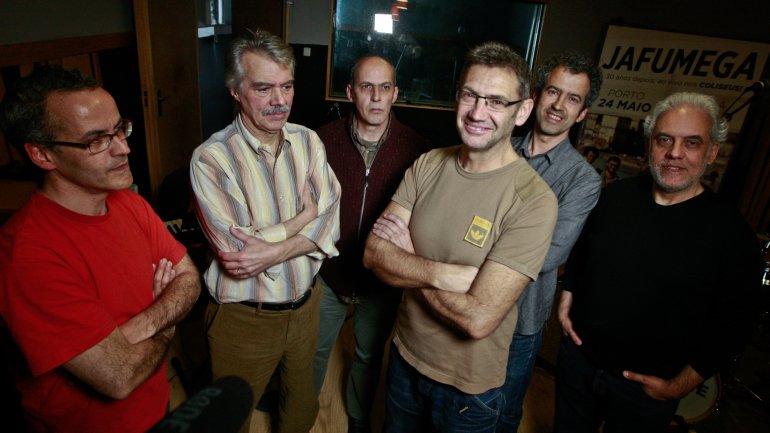Jafumega is a band from Porto formed at a time when the home-grown music scene in the city was highly dynamic, especially in terms of Portuguese rock music.
The group’s history dates back to 1978 when various Porto musicians from some of the most highly renowned bands of the time came together.
Although very young, these musicians had a great deal of experience in a variety of areas that allowed them to spread their talent into different musical genres, which was crucial to shaping the band’s sound and which over the course of just three albums left their name indelibly marked on the history of modern Portuguese music.
After recording their first album, “Estamos Aí”, in 1980, sung in English, Jafumega took the country by storm thanks to the success of “Ribeira”, a song which stood at number one for weeks.
In their first album for Polygram, “Jafumega”, and which forms the basis of this concert, are songs of major impact, such as “Latin’América”, “Kasbah” and “Nó Cego”, that have led to the band being described as the “idols of Porto”.
The song «Ribeira» (immortalized by the chorus «A Ponte é uma Passagem Prá Outro Margem»), «Latin’ América», «Kasbah» or «Nó Cego»: these are just some of the songs with which Jafumega marked Portuguese rock in the 80s. In a decade of great effervescence for music made in Portugal, the band from Porto managed, in the course of just three albums, to inscribe their name in the national songbook, adopting and making their very diverse influences ranging from jazz-rock to pop, funk and reggae.
The history of Jafumega begins in 1978 with the gathering of several musicians from Porto from some of the most renowned groups of the time. Pedro, Mário and Eugénio Barreiros came from Mini-Pop, a young band with great success, José Nogueira played for several years with António Pinho Vargas in several formations that were among the most important of Jazz in Portugal and Álvaro Marques was part of Psico, a historic band in the area of progressive rock.
All the musicians, although some were very young, had a long and diversified experience as well as great technical proficiency and, during the first year of the group’s life, they dedicated themselves to exploring together a huge diversity of musical styles. This free and somewhat tentacular way in which the people from Porto spread their talent across such different musical genres would be decisive in shaping the sound of the band they formed 35 years ago, unparalleled in the groups of the time.
Until the recording of their first album, Somos Aí, in 1980, Jafumega recruited Luís Portugal, a singular vocalist, owner of a very characteristic and unusual voice. Recorded before the Portuguese rock boom, Somos Aí, sung in English, attracts the attention of some press and offers the band the possibility of giving concerts across the country.
But it was the following year, in the midst of the «Portuguese rock boom», that Jafumega took the country by storm, thanks to the hit «Ribeira», which occupied the first place of the tops for weeks. Inspired by the riverside area of Porto, the song, released in 1981 as the B-side of the single «Dá-me Lume», becomes a great radio success, allowing the band to sign a contract with the multinational label Polygram. Curiously, «Ribeira» was not recorded on an album.
The first album for Polygram, Jafumega, from 1982, contains new songs of great impact, such as «Latin’America», «Kasbah» and «Nó Cego». It is on the ride of this LP that the group, described as «whooping Porto» in António A. Duarte’s book, A Arte Eléctrica de Ser Português, participates in the Vilar de Mouros Festival, performing before U2, then also a revelation band, in its live debut in Portugal.
In 1983, Recados, the third and final album of originals, would arrive, where the band explores the approach to the universe of traditional Portuguese music, and from which the single «La Dolce Vita/Romaria» was taken.
The stage curriculum includes more than 300 shows, some in large venues such as the Festa do Avante in front of 100,000 people or the closing of the Festa do Jornal O Sete in Campo Pequeno or two concerts in Paris, at the Forum Les Halles, on the occasion of a exhibition of modern Portuguese music in which Sérgio Godinho and Jorge Palma also participated, among others.
In 1984 the Jafumega decided to stop. Behind was a brief but intense passage through Portuguese pop-rock, marked by the instrumental mastery of all the musicians, by the intensive but discreet use of the most advanced technologies, by the sophisticated production (Mário Barreiros and José Nogueira), by the lyrics of Carlos Tê and José Soares Martins, very important for the definition of the band’s universe and for their ability to absorb national and international references and return them, touched by the air of the times, to the ebullient and unrepeatable scene of Portuguese rock in the 80s.






